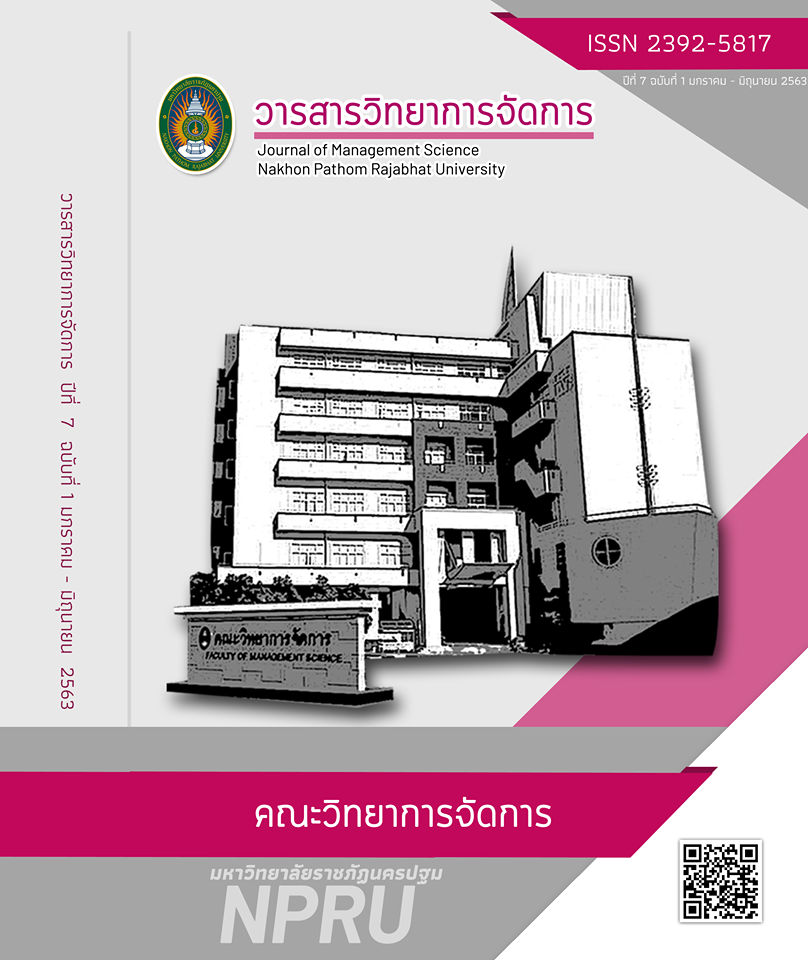Adjusting energy by using cooling systems in large office buildings according to government policies.
Main Article Content
Abstract
Dissertation on adjusting energy by using cooling systems in large office buildings according to government policies. The purposes of this research were to: 1) To study the problems in a large-scale office building use energy cooling systems according government policy. And 2) To study the adjustment of energy consumption of the business sector that requires cooling systems to state policies.
Data analyzed using qualitative research focusing on the grounded theories. The best way to access the facts to investigate (1) Energy expert (2) Large group of large-scale office building that use the Chiller system, a total of 9 people, which is the unit that uses the chiller cooling system directly.
The results of 1. the study showed were as follows the problems of large-scale office building use of energy cooling systems on government policy consisted of 5 factors (1) Shortage of qualified personnel and knowledge (2) Government lacks follow-up By giving priority to document reports rather than seriously checking the quality of the work site (3) The government policy is not flexible for the price of machinery related to energy to be low price. (4) Energy system experts lack sufficient knowledge to entrepreneurs. To define as energy saving policy of the organization (5) The state does not enforce energy laws seriously. And 2. the adjustment of energy consumption of the business sector that requires the cooling system to the government policy, consisting of 4 factors, namely (1) having planning and control, together with cooperation for personnel in the organization to use energy efficiently (2) Regular inspection, maintenance and selection of the most effective equipment (3) Install alternative energy (4) Develop personnel who are responsible for energy quality consistently.
Article history : Received 1 June 2019
Revised 22 June 2019
Accepted 28 June 2019
SIMILARITY INDEX = 0.00 %
Article Details
The views and opinions of the article appearing in this journal are those of the author. It is not considered a view and responsibility of the editorial staff.
References
พิเชษฐ์ ผดุงสุวรรณ์. (2551). สมรรถนะชุมชนในการดำเนินการตามแผนพลังงานชุมชน : กรณีศึกษาองค์การบริหารส่วนตำบลทับปริก อำเภอเมือง จังหวัดกระบี่. วิทยานิพนธ์สาขาการปกครองส่วนท้องถิ่น. คณะวิทยาลัยการปกครองท้องถิ่น.มหาวิทยาลัยขอนแก่น
มยุรี อนุมานราชธน. (2547). นโยบายสาธารณะแนวคิดกระบวนการและการวิเคราะห์. เชียงใหม่: คะนึงนิจการพิมพ์.
วิเชียร วิทยอุดม. (2550). การพัฒนาองค์การ. กรุงเทพมหานคร : บริษัท ธนวัชการพิมพ์ จำกัด.
ศราพร ไกรยะปักษ์. (2553). รูปแบบที่เหมาะสมในการจัดการพลังงานชุมชน. วิทยานิพนธ์ ปริญญาวิทยาศาสตรมหาบัณฑิต. สาขา การจัดการสิ่งแวดล้อม. คณะพัฒนาสังคมและ สิ่งแวดล้อม สถาบันบัณฑิตพัฒนบริหารศาสตร์.
สมบัติ ธำรงธัญวงศ์. (2549). นโยบายสาธารณะ: แนวความคิด การวิเคราะห์และกระบวนการ. (พิมพ์ครั้งที่ 12). กรุงเทพมหานคร: โรงพิมพ์เสมาธรรม.
สุทธิชัย สุขสีเสน. (2550).การมีส่วนร่วมของประชาชนในโครงการวางแผนพลังงานชุมชน จังหวัดสงขลา. วิทยานิพนธ์ปริญญารัฐประศาสนศาสตรมหาบัณฑิต แขนงวิชา บริหารธุรกิจ สาขาวิทยาการจัดการ มหาวิทยาลัยสุโขทัยธรรมาธิราช.
อุทัย เลาหวิเชียร.(2543). รัฐประศาสนศาสตร์: ลักษณะวิชาและมิติต่าง ๆ. (พิมพ์ครั้งที่ 21). กรุงเทพมหานคร. สำนักพิมพ์เสมาธรรม.
Denis, G. St. and Parker, P. (2009). Community energy planning in Canada: The role of renewable energy. Renewable and Sustainable Energy Reviews. 13(8): 2,0882,095.
Maria, E. and Tsoutsos, T. (2004). The sustainable management of renewable energy sources installations: legal aspects of their environmental impact in small Greek islands. Energy Conservation and Management. 45: 631-638.


